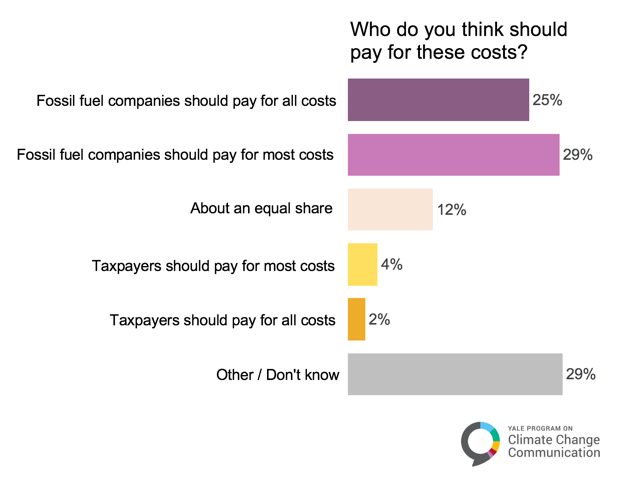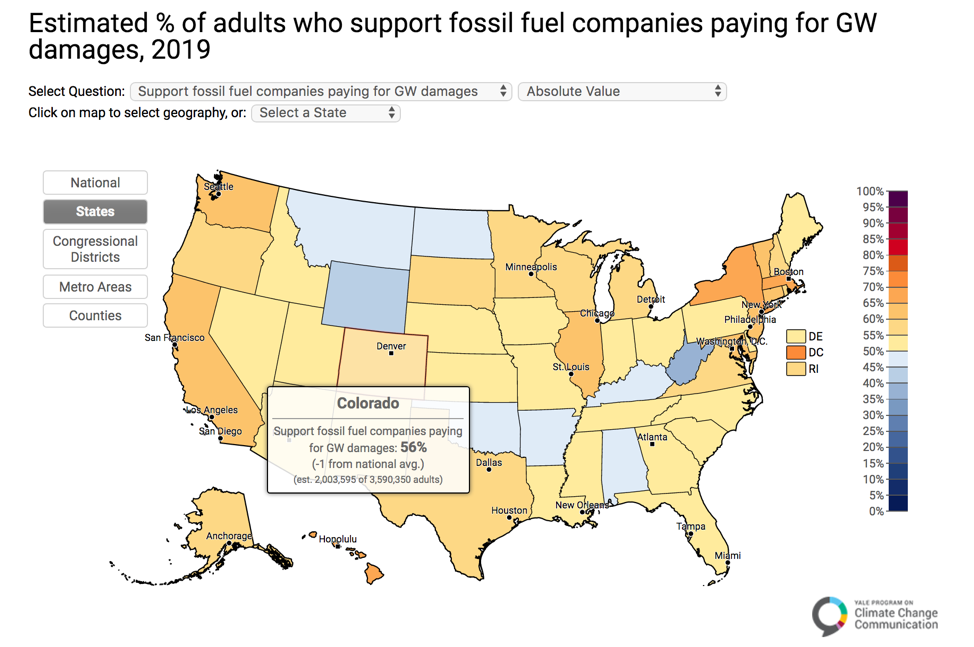Climate Note · Jun 19, 2019
Support for Lawsuits Against Fossil Fuel Companies
By Jennifer Marlon, Xinran Wang, Abel Gustafson, Matthew Ballew, Matthew Goldberg, Seth Rosenthal and Anthony Leiserowitz
Filed under: Beliefs & Attitudes

Climate science has found that the burning of fossil fuels (coal, oil, and natural gas) produced by fossil fuel companies is causing global warming. Global warming, in turn, results in more extreme weather, droughts, wildfires, and flooding from sea level rise. Such impacts are costly to many cities and states in the U.S., often requiring them to rebuild their communities and to develop protections against future damages. As a result, cities such as Baltimore (Maryland), Oakland (California), Boulder (Colorado), and New York City, among others, are suing oil and gas companies like ExxonMobil, BP, and Chevron for knowingly contributing to “property damage, economic injuries and impacts to public health” caused by climate change and sea-level rise.
In a new nationally representative survey, we asked Americans how much they think global warming is harming their local communities, who they think is responsible for paying the costs from the associated damages, and whether they support lawsuits to make fossil fuel companies pay for a portion of local damages.
We find that about half of Americans (53%) think global warming is harming their local community either a “moderate amount” or a “great deal.” Fewer think global warming is harming their community “only a little” (19%) or “not at all” (16%).
A majority of Americans (57%) also think fossil fuel companies have either “a great deal” or “a moderate amount” of responsibility for the damages caused by global warming. In addition, 57% of the public supports making fossil fuel companies pay for a portion of the damages to local communities caused by carbon pollution from burning fossil fuels.

When asked more specifically about whether fossil fuel companies or taxpayers should pay for the costs of the damages caused by global warming, a majority of Americans (53%) think fossil fuel companies rather than taxpayers should pay for most or all of the costs. Only 12% of Americans think taxpayers and fossil fuel companies should pay an equal share, and just 6% think taxpayers should pay for most or all of the costs. Many Americans (29%), however, say they do not know or provide alternative answers.

Half of Americans (50%) support their local officials filing a liability lawsuit against fossil fuel companies whose products contribute to climate change. Fewer (30%) somewhat or strongly oppose this idea, while the remainder do not have an opinion. In addition, two thirds of Americans (66%) somewhat or strongly distrust fossil fuel companies, while about one third (31%) somewhat or strongly trust them.
We are also publishing new interactive maps that depict the geographic variation in opinions about responsibility for global warming damages. The maps reveal widespread agreement that fossil fuel companies are responsible and should pay for a portion of the damages to local communities.
Additionally, these maps show that in all but eight states, a majority of residents believe that fossil fuel corporations are responsible for global warming damages and should pay for some of the damages to affected communities.
Although lawsuits are decided in the court of law, the court of public opinion also plays a critical role in shaping the local, state, national, and international response to climate change.
We encourage you to explore the data using our online interactive tool, where you can also download the data for further analysis.
Methods
These data come from five survey waves conducted from November 30, 2018 to January 6, 2019 using the Ipsos KnowledgePanel®, a representative online panel of U.S. adults (18+). The total sample size was 5,131, with an average margin of error of +/- 1 percentage points at the 95% confidence level. However, the question about who should pay for most or all of the costs of damages from global warming was included in only one survey wave (N = 1,000; margin of error +/- 3 percentage points) and is therefore excluded from maps. Results are weighted to align with U.S. Census parameters. For tabulation purposes, percentage points are rounded to the nearest whole number. As a result, percentages in a given chart may total slightly higher or lower than 100%. Additionally, summed response categories (e.g., “strongly support” + “somewhat support”) are rounded after sums are calculated (e.g., 25.3% + 25.3% = 50.6%, which, after rounding would appear in a chart as 25% + 25% = 51%).
Yale Research Team: Jennifer Marlon, Xinran Wang, Abel Gustafson, Matthew Ballew, Matthew Goldberg, Seth Rosenthal, Anthony Leiserowitz
This research was supported by the Union of Concerned Scientists
